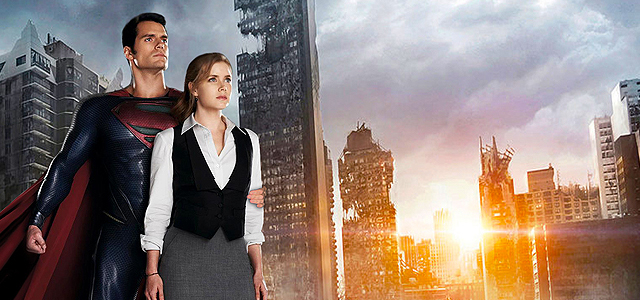(M) Warner Bros DVD/BD & Digital Download
After successfully resurrecting the dormant Batman franchise with his Dark Knight Trilogy, DC Comics and Warner Brothers turned to Christopher Nolan with a far greater challenge: Superman. At a time when audiences seem to prefer their heroes flawed, either with a sense of damage and menace (Batman) or an overly well-developed ego (Iron Man), was there still a market for an idealistic boy scout in a blue suit who fights for truth, justice and the American way?
Whereas the last attempt to resurrect the franchise, Bryan Singer’s Superman Returns, tried to follow on from the Christopher Reeve series, Man of Steel takes us back to the beginning. Rather than working chronologically, the film jumps back and forth, relying heavily on flashbacks to fill in the story of how Kal-El became Clark Kent and then Superman – a handy device to avoid the usual origin story problem of requiring the audience to wait too long before Superman starts being super. No sooner has Clark learned the truth about his heritage, he is called upon to protect his adopted home from invaders from his ancestral home, with the banished Kryptonian military leader General Zod mounting an invasion of Earth, with the intention of establishing it as a new Krypton.
The “invaders from outer space” nature of the threat in Man of Steel makes it feel more akin to Transformers or Independence Day than other spandex-clad superhero movies. That is the biggest difference between this and previous screen adaptations: Man of Steel is a science-fiction movie rather than a fantasy. It looks like a science fiction movie, with the ice-crystal set designs of the Christopher Reeve films abandoned for a design seemingly more inspired by Ridley Scott’s Alien, and it sounds like a science-fiction movie, complete with terrible dialogue about world engines, codexes and Phantom drives.
Like many a Superman adaptation before it, Man of Steel flirts with the allusion of Superman as a Christ figure – an ironic tradition given the hero was the product of Jewish creators Jerry Siegel and Joel Shuster. Our hero’s father, Jor-El, tells his son, “You will give the people of Earth an ideal to strive towards. They will race behind you. They will stumble. They will fall. But in time they will join you in the sun. In time you will help them accomplish wonders.” The Christ allusions in Man of Steel aren’t as overt as they have been in the past – in Superman Returns he was “the light to show them the way,” literally sacrificing himself for the sake of humanity only to be resurrected a couple of days later – instead preferring to focus on the idea of Superman being a symbol of hope.
With Nolan acting as producer, directorial duties were given to Zack Snyder, who is known for his highly stylised use of digital effects in films like 300, Sucker Punch and Watchmen. While he sticks to a pretty simple aesthetic here, his experience with digital effects results in the most visually impressive Superman film yet made, with the little touches – like the way you see the sound barrier being cracked when Superman flies away – being more impressive than the huge effects we are used to seeing in this kind of movie.
A big movie like this one presented as an epic story needs a big-time cast to carry it. British actor Henry Cavill makes for a good Superman, with the appropriate combination of broad chest, chiselled jaw and trustworthy eyes. Amy Adams gets more to work with than past Lois Lanes, with her incarnation of the plucky journalist being courageous, resourceful, and finally intelligent enough to be able to recognise the object of her affection even when he puts on glasses. But it is the depth and quality of the supporting cast which really helps to give the film an epic quality, with the likes of Russell Crowe, Diane Lane, Kevin Costner and Lawrence Fishburne all putting in solid supporting turns.
While it is certain to perform strongly at the box office, ultimately Man of Steel runs into the same issues that Superman stories always seem to: that the build-up is more interesting than the climax. In this case the interest is in the existential journey of a young Clark Kent who is trying to work out who he is, why he is here and what he should do with his abilities, and in the way people respond to him and what he represents. But an adventure story climax requires a level of threat that is hard to muster when your hero is practically invincible. In this case he has an adversary who is equally invincible, and watching two of them hitting each other starts to get a bit tedious after a while.
Duncan McLean












